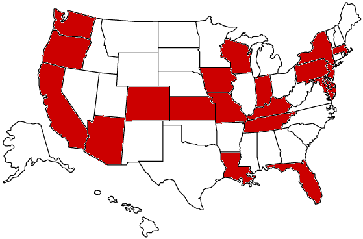After plummeting in 2011, FCC enforcement against unlicensed broadcasting rebounded ever so slightly last year – but not in any meaningful fashion.
 About 100 pirate radio stations in 19 states had contact with the federales in 2012, resulting in 245 specific enforcement actions. Interestingly, the vast majority of these happened in the first half of the year; for some reason, enforcement activity took a nosedive in July and never recovered.
About 100 pirate radio stations in 19 states had contact with the federales in 2012, resulting in 245 specific enforcement actions. Interestingly, the vast majority of these happened in the first half of the year; for some reason, enforcement activity took a nosedive in July and never recovered.
FCC enforcement against radio pirates continues to be of an administrative nature, with visits and warning letters the preferred tools. Although the agency still seems to be ratcheting up its issuance of monetary penalties (cracking the $200,000 mark in unlicensed broadcast forfeitures for the first time, resulting in an average fine of approximately $13,700), there’s no sign that any of this is having a deterrent effect.
Take, for example, the case of Fabrice Polynice. Arrested in 2006 under Florida’s anti-pirate statute and sentenced to a year of community service, Fabrice got back on the air and played some serious cat-and-mouse with authorities last year.
Polynice’s station, Radio Touche Douce, changed locations at least three times around North Miami until the FCC – who monitored his activity for at least six months – finally decided to serve him with a $25,000 Notice of Apparent Liability just last month. Remember that NALs are "pre-fines" – the FCC will formally serve him with a Forfeiture most likely this month or next, which allows them to put this coup toward its 2013 enforcement statistics, even though it’s quite likely Polynice’s been on the air for years. This vividly illustrates the relative toothlessness of state-level unlicensed broadcast enforcement.
$25,000 is also the maximum fiscal penalty doled out by the FCC to a pirate broadcaster in 2012: it served two other pirates – one in Florida (another repeat offender) and one in California – with similarly stiff notices. Of the 19 Notices of Apparent Liability issued in 2012, 14 (74%) went to pirates in Florida. Forfeiture Orders broke the same way: 15 of 19 (73%) went to Floridians, accounting for $132,200 of the $205,000 (64%) that the FCC hopes to collect.
Yet collection continues to be a chancy thing. Dexter Blake, first dinged by the FCC in 2008 and fined over the course of 2009 and 2010 for FM broadcasting in Mount Vernon, New York, successfully whittled his $10,000 penalty down to $1,700 this past December. That’s nearly five years of effort on the part of the FCC to penalize a single pirate, and there’s no guarantee that the agency will ever see a dime.
This may explain why even folks with FCC licenses are firing up undocumented boxes. Glen Rubash, otherwise known as amateur radio operator KC0GPV, got busted by the FCC this year for an unlicensed FM station run out of his Manhattan, Kansas home. Although he really should’ve known better – and the FCC swears that it comes down hard on those who should know better – Rubash received only the standard $10,000 Notice of Apparent Liability.
The bottom line remains that the FCC’s campaign against unlicensed broadcasting is low-intensity and questionably effective. However, given the scope of unlicensed broadcasting to be found from coast to coast, the odds are still well in favor of the pirate who understands the relative risk at hand.
Skip to content